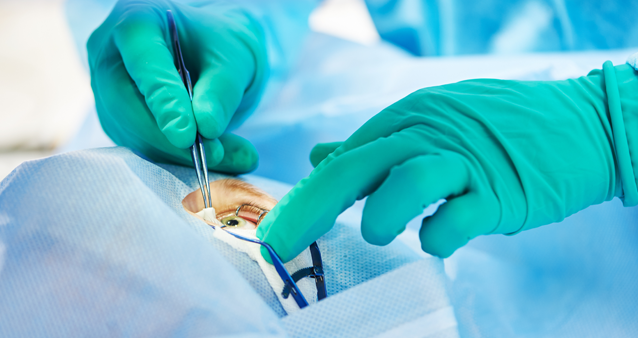Laser Eye Surgery: Will your Medical Aid Cover it?

Yes, some Medical Aids in South Africa will cover a portion of the costs of refractive-correcting laser eye surgery in certain cases. So, who covers what and how can you make that work for you?
Laser eye surgery can be life-changing for those who wear glasses or contact lenses. The surgery is quick, relatively painless and comes with a limited potential for side-effects — but it's not cheap. Many people ask whether their Medical Aid will cover the cost of vision-correcting laser surgery and the answer is largely: "yes, but it depends...".
What is laser eye surgery?
Laser eye surgery is used to treat the refractive errors in the eye that cause myopia (that's just a fancy way of saying near-sightedness), astigmatism (where ghost images form at a distance) and hyperopia (far-sightedness).
South African good news champion and all-round positivity compass, Good Things Guy Brent Lindeque, underwent laser eye surgery in 2020 and says he's never been able to see as clearly in his life — even with glasses or contact lenses. "As each day passes, all I keep thinking is why did I not do this sooner?" And he's not the only one. To date, a whopping 30 million people worldwide have had vision-correction laser surgery.
What are the different types of laser eye surgery?
Laser eye surgery can be used to correct a variety of vision impairments, including cataracts, but the three basic versions used to correct basic vision are Laser-Assisted In-Situ Keratomileusis (Lasik), Photorefractive Keratectomy (PRK) and Implantable Collamer Lens (ICL) surgery.
Lasik eye surgery
In Lasik surgery, the eye is mapped before the surgery, which involves each eye being anaesthetised and a thin flap is cut in the cornea by laser. A second laser corrects the imperfections in the exposed corneal bed, before the corneal flap is repositioned.
PRK vision correction surgery
PRK is an option for patients who are not candidates for LASIK, often because the cornea is too thin. PRK reshapes the surface of the cornea, rather than opening it up. Lindeque underwent PRK surgery and says: "It took around five minutes to line up the computer with my eye. Once the machine lined up, it took just seven seconds an eye. No scary laser. No pain. No weird smell. Nothing. And then it was done."
ICL eye surgery
An ICL can be thought of as a permanent contact lens that is implanted in the eye between the iris and crystalline lens. This lens is invisible to patients and observers. ICLs are a good solution for patients with dry eyes or thin corneas and those who are not suitable for laser correction.
Will Medical Aid pay for laser eye surgery?
Most Medical Aids don't cover the cost of elective laser surgery because it's seen as a lifestyle surgery in much the same way that elective cosmetic surgery is. Some may, however, refund the planning tests from day-to-day benefits if you have funds in your Medical Savings Account.
Some Medical Aid options do include a refractive benefit, though they'll likely only pay 100% of their scheme rate for the surgery. Since most laser corrective clinics aren't part of Medical Aid networks, you'll probably have to pay upfront and claim later.
How much does laser eye surgery cost in South Africa?
Surgery can cost anywhere from R15,000 to upwards of R45,000 depending on the surgery and circumstances, so it's worth asking your Medical Aid about the limits for your particular plan.
Discovery Health's Executive, Classic and Essential Comprehensive and Priority Series plans include cover for refractive-correcting surgery, subject to annual limits, at a maximum of R9,550 per person on the top plan. The annual limit applies to all eye-related claims, including frames and contact lenses. This is not a separate benefit and limits apply to claims paid from your Medical Savings Account and your Above Threshold Benefit.
Bestmed's Beat 1 & 2 plans only cover this type of surgery in line with Prescribed Minimum Benefits, while Beat 3 and Beat 4 cover the surgery at 100% of the scheme tariff, subject to preauthorisation and protocols. Payment on Beat 3 is limited to R9,155 per eye and R10,333 per eye on Beat 4.
Fedhealth pays the costs of laser eye surgery from the in-hospital benefit if it's performed in a day clinic, day ward or an outpatient section of a hospital, and if the surgery is preauthorised. Members on flexiFED 1, flexiFED 2GRID, flexiFED 3GRID and flexiFED 4GRID are liable for a co-payment of R2,100 if a non-network day surgery facility is used.
Get the best deal
You can easily compare quotes from Medical Aid schemes on Hippo.co.za to find out which one is right for your needs (and your pocket!). Bearing in mind the limits of each scheme and its products, it's best to explore the product brochures for each option to determine which one best covers your specific ophthalmology needs.
This article is for informational purposes only and should not be construed as financial, legal or medical advice.
Hippo Blog Categories

































